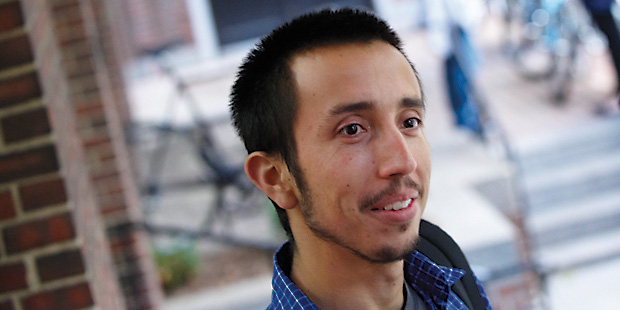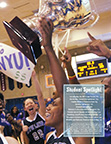The Passionate Activist
NYU Law’s new Soros Fellow is dedicated to fighting injustice.
Printer Friendly VersionGrowing up, Camilo Romero ’12 says, “I was often angry.” His awareness of injustice fueled a passion to defend the weak and disadvantaged that has recently been recognized as he becomes the third NYU Law student since 2005 to win a Paul and Daisy Soros Fellowship for New Americans. “There was a very big pebble in my shoe,” he says. “In fact, in both shoes.” But he chose idealism over despair. Born in California after his family escaped the violence in Colombia, Romero grew up in a workingclass household in Costa Mesa that included his mother, an administrative assistant; his grandmother, a housekeeper; and his younger sister.
Even before college, Romero was interested in immigrant rights and community building. At the University of California, Berkeley, Romero found a language for his passion to correct injustice. He also encountered the cause that would come to define much of his life: holding multinational corporations accountable for human rights abuses of their workers and others.
Initially becoming involved with SINALTRAINAL, Colombia’s largest food and beverage industry union, because of U.S. military intervention in Colombia, Romero soon joined a campaign against Coca-Cola, helping organize campus boycotts across the United States to pressure the company to address allegations of abuse of union organizers in Coca-Cola facilities in Colombia. (In a statement on its website, Coca-Cola defended its reputation and said that, “for as long as we have been in Colombia, the Company and the independent franchise bottling partners have made efforts to protect the Coca-Cola workforces.”)
“Camilo is strikingly passionate about social justice as well as having a vigorous understanding of the social world,” says Professor Samuel Lucas, who taught Romero at Berkeley. “Those two things provide an unbeatable combination when seasoned by his obvious insight, intellectual capabilities, and empathy for disadvantaged groups and individuals.”
The Coca-Cola work brought Romero to New York, where in 2005 he helped win a ban of Coca-Cola products at NYU. He was in the city, too, in February 2009, when the University allowed Coke back on campus. The next day, Romero received an acceptance letter and full scholarship from NYU Law. It was a crisis-of-conscience moment.
“Despite feeling conflicted,” he recalls, “it also was motivating to think I could use the opportunity to help attain my goals.” His decision to pursue a J.D. had stemmed largely from litigation against Coca-Cola—he’d seen that activism alone was insufficient. Romero chose NYU for its public service emphasis: “Law school is a tool of access, so no matter what cause you’re fighting for, a degree from a school as elite as NYU is leverage.”
Now an organizer and member of the legal team for SINALTRAINAL, Romero attained more leverage this spring with his Soros Fellowship, which provides tuition assistance to immigrants or children of immigrants. More important, Romero says, the accolade validates his work of the past seven years: “This award is not for me, but for those who will come after me.”
Romero actively seeks mentors, even those he hasn’t been taught by, such as Professor of Clinical Law Anthony Thompson, an expert in utilizing advocacy to shape public policy. “There are two things about Camilo that are very unique in first-year law students,” says Thompson. “One, he comes into the study of law with an acute appreciation for the role of organizing and activism, in addition to litigation, as ways to better the plight of the less fortunate. Two, he’s had some experiences outside the country, and he comes with a very broad perspective of what it means to be involved in social justice and human rights issues.”
Romero values leadership development, and wants to ensure a path for others. “There’s a victory in this struggle,” says Romero of his activism. “By the time we die the world will still suffer from inequalities, but if we can make it better, then we’ve done our part.”
—
All of 2010 Student Spotlight


 Multimedia
Multimedia